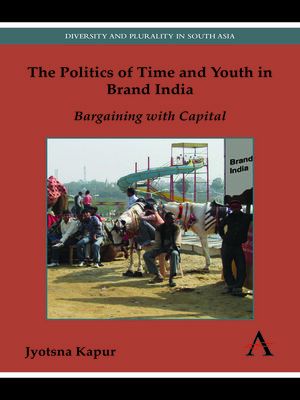The Politics of Time and Youth in Brand India
ebook ∣ Bargaining with Capital · Diversity and Plurality In South Asia
By Jyotsna Kapur

Sign up to save your library
With an OverDrive account, you can save your favorite libraries for at-a-glance information about availability. Find out more about OverDrive accounts.
Find this title in Libby, the library reading app by OverDrive.



Search for a digital library with this title
Title found at these libraries:
| Library Name | Distance |
|---|---|
| Loading... |
This book traces the heightened time-consciousness that has emerged since the 1990s in popular Indian discourses – across cinema, television, print and consumer culture – and argues that these anxieties concerning time are symptomatic of the struggle between labor and capital. Drawing on critical theory, cinema and media studies and Marxist-feminist concepts, Kapur shows how the recent political-economic shift in India toward neoliberalism has been accompanied by a new emphasis on youth and a preoccupation with change, novelty and the acceleration of time, with profound consequences for conceptions of time, youth and the relations between generations.
|Has India's shift to neoliberalism since the 1990s led to a heightened awareness of time and its passing, an intense preoccupation with youth, and anxieties over the relations between generations? 'The Politics of Time and Youth in Brand India' discusses the politics of time that have emerged in popular discourses across cinema, television, print and consumer culture, arguing that contests over conceptions of time are, in fact, sites of battle between labour and capital.
Kapur shows how the recent political-economic shift in India is accompanied by a new emphasis on youth and a preoccupation with change, novelty and the acceleration of time. This perception of time is examined through an interdisciplinary approach, drawing on critical theory and cinema and media studies, as well as two concepts from Marxist-feminist theory. The first focuses on the notion of capitalist development as a systemic form of underdevelopment, which perpetuates a radicalised individualism while simultaneously erasing selfhood, as each life-time is reduced to homogenous, commodified units of time, each with a varying price dependent upon one's position in the market. The second is the critique of the time-orientation of capitalism and its promise of freedom through novelty where, in fact, its reliance upon a system of private accumulation based on exploitation favours calculations of profits in the present over investing in the future. Together, these approaches shed light on India's contemporary cultural politics, explaining how the country's shift to neoliberalism is deeply intertwined with profound conflicts over conceptions of time, youth and the relations between generations.







